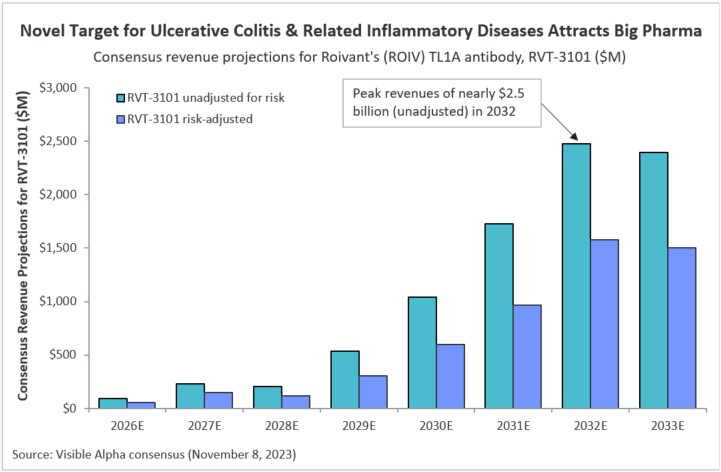Key Takeaways
|
TL1A (TNF-like ligand 1A) is a high-value target that has gained significant interest of late. This target has implications across several auto-immune inflammatory diseases, including ulcerative colitis and Crohn’s disease.
In June 2023, Merck & Co. (NYSE: MRK) acquired Prometheus Biosciences for $10.8 billion, driven by the promise of its TL1A antibody, PRA-023.
In October 2023, Roche (SIX: ROG) agreed to acquire rights to RVT-3101, Roivant Sciences’ (NASDAQ: ROIV) TL1A-targeting antibody, for $7.1 billion upfront and $150 million in upcoming milestone payments. RVT-3101 is held under Telavant Holdings, a Roivant and Pfizer (NYSE: PFE) joint venture. Roivant owns 75% of the joint venture and Pfizer owns 25%.
Analysts’ projections for RVT-3101 revenue
Visible Alpha consensus estimates project peak global revenues of nearly $2.5 billion in 2032 (not adjusted for risk). Risk-adjusted consensus revenue projections for 2032 are nearly $1.6 billion. Analysts apply a probability of success of 61.7% for RVT-3101. Currently, RVT-3101 has completed Phase 2 studies and is ready to begin Phase 3 clinical trials for ulcerative colitis. For Crohn’s disease, RVT-3101 is currently in Phase 2.
Figure 1: Consensus revenue projections for Roivant’s RVT-3101

About TL1A
TL1A is secreted from antigen-presenting cells upon stimulation and plays a central role in activating innate and adaptive immune pathways by binding to TNFRSF25 (or death receptor 3 (DR3)) on T cells. Under disease conditions, loss of regulation of TL1A-TNFRSF25 signaling leads to proinflammatory effects including excessive T cell activation. This inflammatory pathology is implicated in inflammatory bowel disease that collectively includes Crohn’s disease and ulcerative colitis. The potential for blocking TL1A across numerous other auto-immune inflammatory diseases is also promising.



